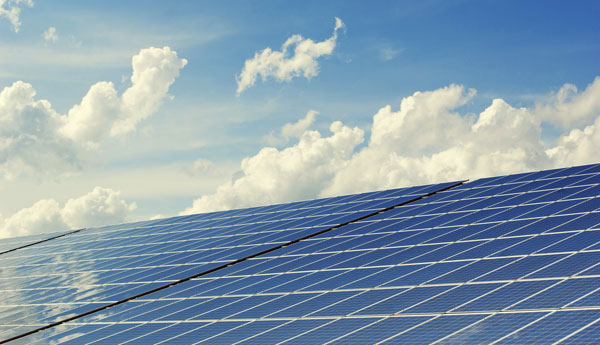
Last week, we posted a little primer on the overall makeup of a solar energy system. That, of course, is only the beginning. Every specific category on that list, from panels to batteries, represents a complex segment of the system that requires serious research before buying. This in mind, we’ll be covering each of these links one by one, to give a more complete understanding of both the science involved, and what to look for when purchasing the implements correct for your purposes.
Construction
Solar panels are primarily based in silicon, a highly conductive element that generates electrical current when exposed to light. Composed of units called “cells,” each of which is a 36-square-inch piece of silicon, solar panels are made by laying out a grid of cells, with a protective sheet on the rear and glass on the front. A collection of such panels is termed an “array.” When wired into the same inverter however, they are known as a “string.” This is important because each inverter will have a maximum “string” size it can support, meaning a maximum number of panels it can have in its system.
There are two standard configurations for solar panels: 60-cell or 72-cell. The only real difference between these two is that 72-cells are about a foot taller, thanks to the extra 12 cells. While other sizes do exist, these are the main you’ll see for at-home use. Cells are either monocrystalline or polycrystalline–monos are cut from a single source of silicon, whereas polies come from multiple. This makes mono cells slightly more efficient.
Energy
Solar panel energy is measured in terms of efficiency rating, which sounds confusing to some. For instance, a 20-percent efficiency rating does NOT mean that your solar panel is only producing at 20-percent capacity, but that it is converting only 20-percent of the energy coming from the sun. A common explanatory example is, if the sun is producing 500-watts, and you have a 100-watt panel, this panel is producing at 20-percent efficiency. Thus efficiency really only matters in terms of space–the more efficient panels, the less/smaller surface area of them you’ll need.
While on the topic though, solar panels are rated according to how much Direct Current (DC) power they produce. This is measured in “wattage,” with the wattage rating referring to how much power the panel produces in an hour. A 300-watt panel, for instance, will produce 300-watts an hour under optimal solar conditions. In terms of size, if you have a 300- and a 400-watt solar panel, both with an efficiency rating of 20 percent, the 400 watt will be physically larger. If the 400 watt panel has a 25-percent efficiency rating however, they should be closer to the same size.
This should be enough to get ya’ll going on solar panels. Tune in to our next solar-panel-project installment, for more on the next link in our system: combiner boxes.
A humble homesteader based in an undisclosed location, Lars Drecker splits his time between tending his little slice of self-sustaining heaven, and bothering his neighbors to do his work for him. This is mainly the fault of a debilitating predilection for fishing, hunting, camping and all other things outdoors. When not engaged in any of the above activities, you can normally find him broken down on the side of the road, in some piece of junk he just “fixed-up.”

Matt Kaufman says
I am looking to create a small system to just power my water heater. then build onto that, with the various panels out there, do you have a few recommendations? thanks
Thomas says
I am curious about the safety issues if you have to place your battery bank in the basement of your residence? Are fumes produced to today’s batteries? What are the potential fire risks. Concerned about homeowner insurance covering losses if something happens.
Troy Adams says
If you use AGM batteries they do no give off fumes as they are VRLA….. valve regulated lead acid. If you research AGM batteries you will see how the design came about. Homeowners insurance on the other hand is rather shocking my cost went up to $210 a year I will have to figure that into my break even.
Jim Rogers says
I’m contemplating creating a solar system for a remote cabin In Tennessee without heat and air,; will the extreme temperature difference between winter cold And summer heat degrade battery performance and shorten their lifespan?
Thanks,
Jim
Jayne says
I’m not interested in selling back to the electric company. Every solar company I’ve spoken with only offers that option. If I want to be totally off-grid how can I proceed?
Gary M says
Know that when selling power, you receive wholesale pricing, not retail. Obtain a cost estimate prior to installation. Also, obtain efficiency report as well as length in years they will work, and when efficiency drops off. As well as battery cost for replacement Then do a cost benefit analysis over that term to see if solar will provide long term savings or not. It may be beneficial if you are in a rural setting. Know the costs before catching rays!
John Yerby says
If one expects to operate a mixed group of appliances ( refrigerators. ac ( cycling on and off computer, tv
lights Ec t ), will the on off surges and variable current draw effect the more sensitive ie tv computer be affected ?
Michael says
I hope there will be a discussion of brands of equipment. I have been following different brands and it is difficult to determine what I should get. I’m mostly looking at a portable battery/solar panel system, but the whole systems can be very expensive. Thus it is important to make the best decision possible.
Marshall says
Appreciate the articles and lamens term approach as researching this has always been a challenge to me. Looking forward to the next article.
Carl says
Would be nice to see a discussion on cost-to-benefit ratio of installing a home solar system. Also, maybe a discussion on which option is a better deal; 1) install ur home owner system or 2) allow a provider to install ur system ;
whereby, u continue to pay for electricity and they sell any excess produced!